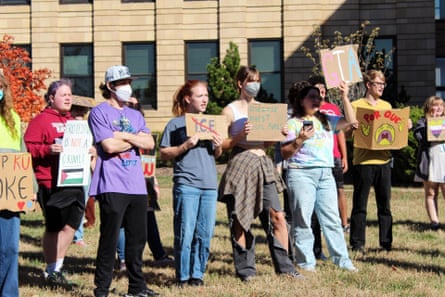Students, faculty and staff at more than 100 campuses across the US rallied against the Trump administration’s assault on higher education on Friday – the first in a planned series of nationwide, coordinated protests that organizers hope will culminate in large-scale students and workers’ strikes next May Day and a nationwide general strike in May 2028.
The day of action was organized under the banner of Students Rise Up, a network of students including both local groups and national organizations like Sunrise Movement and Campus Climate Network. Students were joined by faculty and educational workers’ unions like the American Association of University Professors and Higher Education Labor United.
Protesters called on university administrators and elected officials to denounce the president’s months-long effort to force US universities to abide by its ideological priorities and urged them to reject Trump’s “compact”, which would give universities preferential access to federal funding in exchange for a commitment to advance the administration’s conservative agenda. Only one university, New College of Florida – a public school that state legislators have turned into a bastion of conservatism – has so far accepted it.
“Universities should be a place of learning, not propaganda machines,” Alicia Colomer, managing director at Campus Climate Network, said ahead of the protests. “That’s why students, workers and alumni around the country are taking action.”
As the day unfolded, hundreds of students across the country walked out of classes, unfurled banners, and rallied on campuses, often joined by faculty and other staff. In addition to denouncing the compact, they called for a more affordable education and for the protection of all students – from transgender to international ones.
At the University of Kansas, about 70 students demanded administrations divest from weapons manufacturers and Israel, refuse to collaborate with ICE, safeguard gender-affirming housing and meet faculty’s demands for fair contracts. At Duke University, in North Carolina, professors held signs demanding the university stand with immigrants, pay its workers a $25 hourly wage, and protect trans and international students. At Brown University in Rhode Island – one of the first institutions to reach a settlement with the Trump administration earlier this year – passersby were invited to endorse a banner listing a series of demands by dipping their hands in paint and leaving their print, while a group of faculty members nearby lectured about the history of autocracy.

“Trump came to our community thinking we could be bullied out of our freedom,” said Simon Aron, a sophomore and co-president of Brown Rise Up. “He was wrong.”
In New York City, students and faculty from multiple campuses gathered by the midtown headquarters of the investment firm Apollo Global Management to protest CEO Marc Rowan, a billionaire Trump donor and key architect of the compact whom they say “has no business making policy for higher education”.
They cited Rowan’s involvement with the online University of Phoenix, which they described as “the largest single producer of student debt in the country” and his role in paving the way for the ongoing abuse of civil rights legislation to target universities over students and faculty’s criticism of Israel.
A spokesperson for Apollo did not respond to a request for comment but the firm reportedly instructed staff to stay home on Friday in anticipation of the protest. In a recent New York Times op-ed, Rowan defended the compact, writing that American higher education is “broken” and that “course correction must come from the outside”.
Amy Offner, a history professor at the University of Pennsylvania, told the Guardian that the campaign against Rowan is part of a broader effort to protect US higher education from the influence of ultra-wealthy individuals. “Billionaires should not control what can be taught and studied in the United States,” she said.
The protests marked the first time that students, faculty and staff have staged such a large-scale response. “There is only one way forward in saving higher education and democracy writ large and that is students, faculty, staff united,” Todd Wolfson, the president of the AAUP, said on a call with protest organizers last week. “We have to become a new political force.”

 German (DE)
German (DE)  English (US)
English (US)  Spanish (ES)
Spanish (ES)  French (FR)
French (FR)  Hindi (IN)
Hindi (IN)  Italian (IT)
Italian (IT)  Russian (RU)
Russian (RU)  3 weeks ago
3 weeks ago
























Comments